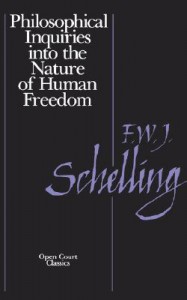3
Followers
24
Following
Cogitatio
Reflections on philosophy, theology and just observations on life.
Currently reading
The first epistle of H. N. A crying-voyce of the holye spirit of loue. Translated out of Base-almayne into English. (1574)
The Works of James Arminius, Volume 1
Politics, Law, and Morality: Essays by V.S. Soloviev
Meditations on the Soul: Selected Letters
The Complete Poetry and Prose
The Encyclopedia of Philosophy (8 Volumes in 4)
Cambridge Platonist Spirituality
Wellsprings of Faith: The Imitation of Christ; The Dark Night of the Soul; The Interior Castle
Paul and the Stoics
Locke: Two Treatises of Government (Cambridge Texts in the History of Political Thought)
Philosophical Inquiries into the Nature of Human Freedom
 This is the second book I've read by Schelling and the premise is a perennial favorite among philosophers. This book borrows quite a bit from Leibniz and Boehme, and to some degree, starts where they left off -not that it recapitulates every viewpoint of those writers; Schelling does have his own views and his approach is often unique. Whether he solved all of the problems regarding the notion of freewill is open to debate, but he does present some excellent points. One almost has to be acquainted with Boehme and Leibniz to be able to follow his train of thought though. Boehme's notion of the ungrund plays such a significant role, that from what I can tell, Schelling's work centers on it to a large degree. I've read both Leibniz and Boehme and thought their ideas were interesting, while also not always agreeing with them wholly. It is hard to deny the latter's profound influence on the Romantics and the Idealists. His influence is ubiquitous.
This is the second book I've read by Schelling and the premise is a perennial favorite among philosophers. This book borrows quite a bit from Leibniz and Boehme, and to some degree, starts where they left off -not that it recapitulates every viewpoint of those writers; Schelling does have his own views and his approach is often unique. Whether he solved all of the problems regarding the notion of freewill is open to debate, but he does present some excellent points. One almost has to be acquainted with Boehme and Leibniz to be able to follow his train of thought though. Boehme's notion of the ungrund plays such a significant role, that from what I can tell, Schelling's work centers on it to a large degree. I've read both Leibniz and Boehme and thought their ideas were interesting, while also not always agreeing with them wholly. It is hard to deny the latter's profound influence on the Romantics and the Idealists. His influence is ubiquitous.This book is often held as being Schelling's best. The book is very good, but I actually liked his Philosophy of Mythology more. The ideas in it were a little more unique and thought-provoking in my opinion.













